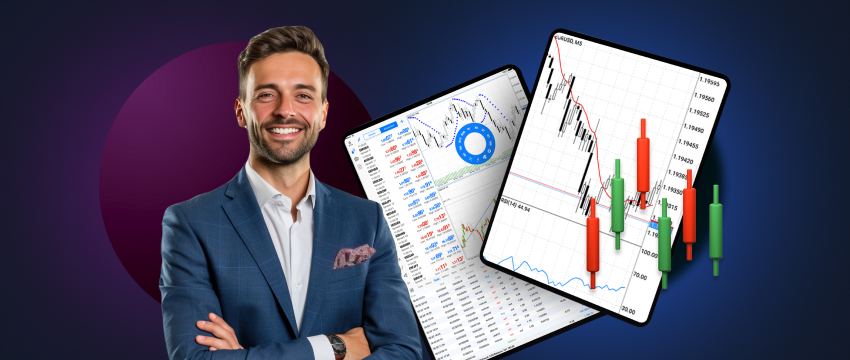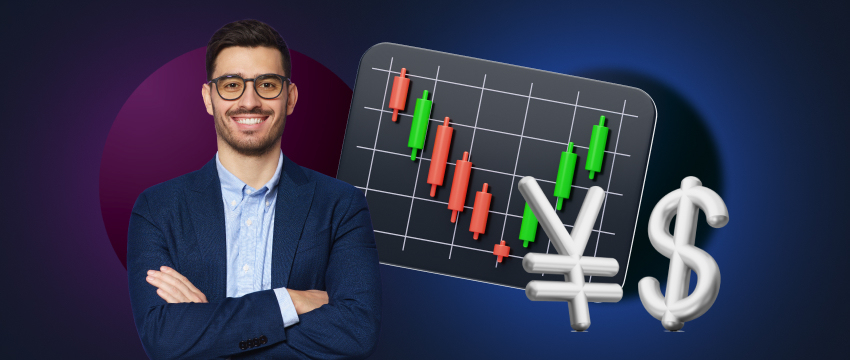Trading, regardless of the asset, requires a specific skill set to achieve some measure of success.
Mastering these skills is key. It allows traders to navigate the financial markets more effectively. Additionally, it helps execute transactions based on objective data. This approach is more reliable than trading based on emotions.
Let’s explore what you should focus on to increase your chances of becoming a successful trader.
1. Make trading decisions based on ongoing analysis
Depending on the investment strategy, both technical و fundamental analysis are essential. These components can be used either standalone or in combination. In any case, they play a core role in informed decision-making.
Data is king and knowing how to interpret indicators, charts, graphs, etc, is crucial for making those decisions.
Strong analytical skills are essential for accurately assessing market conditions, identifying trends, and reacting to events in a timely fashion.
Without them, an investor may find it challenging to understand key signals, impacting their ability to recognise trading opportunities or limit risk.

2. Knowing how to manage risk
Just as important as knowing how to conduct technical and fundamental analysis is knowing how to implement proper risk management measures.
In fact, one of the biggest challenges for those new to trading is managing risk in a way that will protect your money and avoid you losing all your capital on an isolated poor-performing trade. السيكولوجبة في التداول can be deployed in many different ways:
Stop-Loss and Take-Profit Orders
- Stop-loss orders and take-profit orders are probably some of the most common tools traders use to protect their capital from significant losses or to lock in profits.
- In the case of stop-loss orders, these are triggered when the market reaches a predefined price in order to limit losses. Take-profit orders, on the other hand, go into effect when prices hit a particular target to lock in profits.
Position Sizing for Risk Management
- Position sizing is another well-known risk management technique that refers to the sum of money a trader should allocate to a single transaction.
- For beginner traders, starting with smaller trades may limit losses that would otherwise be incurred should you overexpose yourself.
Portfolio Diversification for Risk Management
- Portfolio diversification is a risk management strategy that involves the trader spreading their capital across a variety of assets. The idea is that the impact of one losing trade will be offset by gains in another.
Avoiding Overtrading
- Resisting the temptation to overtrade due to boredom or the desire to make quick profits. Overtrading can very quickly lead to poor decision-making, ultimately resulting in capital loss.
Learning from Mistakes
- Learn from your mistakes. Mistakes can make for valuable learning experiences. By being flexible and adaptable, you’ll likely learn what went wrong and adjust your strategy accordingly. This will help you become a better trader.
The Importance of a Trading Journal
- Keeping a trading journal to record past trades, including the rationale behind those trades. Having access to historical data like this provides valuable insights into your trading behaviour, and also helps you identify patterns, mistakes and areas for improvement. By regularly reviewing your portfolio, you’ll likely make better informed decisions and avoid past mistakes.
3. Knowing how to manage your trading psychology
The ability to manage your emotions in such a way that they don’t influence your investing decisions is another essential skill an investor must possess.
Emotional reactions can lead to adverse decision making which makes having a strong trading psychology key. In fact, some of the most common emotions impacting trading outcomes are fear, greed, and anxiety.
While being scared and overly anxious can see you exiting a trade prematurely or not entering a trade at all, greed may see you take excessive risk.
Additionally, highly volatile markets may also see traders panic instead of acting calmly or sensibly. Having the skill of knowing how to build mental resilience is vital for more long-term success.
4. Building a trading plan and engaging in continuous learning
Building a strategic trading plan will keep you better focused, thereby helping you to achieve more consistent goals. An investment plan is ultimately the structure of how you will trade.
It typically specifies your objectives, the rules by which you’ll trade, including entry and exit points, the risk management techniques you’ll be implementing, and the level of risk you’re willing to incur.
Following this plan will help you stay disciplined and avoid making impulsive decisions. It also allows you to monitor your progress, assess the performance of your trades, and make tweaks where required. This ensures you stay aligned with your long-term trading objectives, while managing risk strategically.
In addition to building a trading plan, you may also consider investing your time in ongoing trading-related education to keep yourself updated with the latest advancements in trading technologies and trends. While not a skill in the true sense, it is certainly a vital aspect of longevity in investing.
Staying informed about new strategies and market developments may give you a competitive edge, and help you remain agile and better equipped to leverage emerging opportunities.
Learning comes in many different forms, be it blogs, videos, podcasts, webinars, ebook, seminars, etc, to suit the learning styles of all types of traders. Furthermore, traders can also make use of tools like Economic Calendars و حاسبات التداول to become better informed and to make decisions based on solid data.

5. Knowing how to properly manage your time
Time management is incredibly important, particularly for those with limited time to trade. In order to be able to trade effectively during optimal market times, focused attention is important.
To be able to focus properly means setting the required time aside to spend on vital investment activities without becoming overwhelmed.
These activities include monitoring the markets, engaging in technical analysis, entering and exiting transactions, etc. One must remember that markets like forex operate 24/5 but this is not to say that all hours are created equal.
Traders may be more inclined during sessions that exhibit high liquidity, e.g. overlap between London and New York sessions. Knowing when your preferred session becomes active is vital to ensure you don’t miss trading opportunities.
6. Learn your way around the MetaTrader 4 platform
A great way to become a more skilled investor is by getting practical experience. A demo account is one such way of obtaining this. A demo account offers the trader a simulated trading environment in which to enter and exit trades using virtual funds, and assess outcomes, without the risk of losing your own money.
By signing up for a demo account with T4Trade for example, you’ll also gain access to the MetaTrader 4 (MT4) platform, which offers the opportunity to learn more about technical analysis and discover popular MT4 technical indicators.
You can also use the platform to test out different trading strategies, regardless of complexity, and make tweaks if and where required. This makes signing up for a demo account appealing to both beginner and professional traders.

Become T4Trade trader
T4Trade has established a robust reputation, appealing to traders in many countries across the globe. T4Trade ticks many of the boxes we’ve mentioned in the article in terms of regulation, reliability, learning opportunities, and more.
Other reasons that traders choose T4Trade are that it offers competitive spreads, flexible leverage, and quick and easy withdrawals and deposits.
T4Trade also provides multiple account types to choose from, meeting the demands of traders at all levels. Its منصة تداول, MT4, is user-friendly and feature-rich, offering an optimal trading experience.
T4Trade’s multilingual customer support is top-tier and on hand 24/5 to help you with any pressing trading-related queries. Furthermore, T4Trade offers access to high-end educational resources to help you become a better trader.
إخلاء مسؤولية: This material is for general informational and educational purposes only and should not be considered investment advice or an investment recommendation. T4Trade is not responsible for any data provided by third parties referenced or hyperlinked in this communication.




